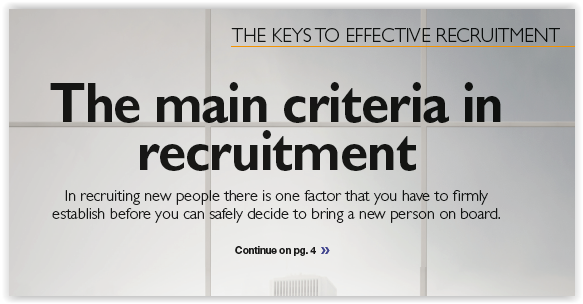
The main criteria in recruitment
In recruiting new people there is one factor that you have to firmly establish before you can safely decide to bring a new person on board.
Production record?

The first and by far the most important factor in hiring is to establish and understand a candidate’s PRODUCTION RECORD.
A “product” can be defined as the valuable final result of a directed effort to get an item or activity fully completed. And the fact that it is really completed, it is valuable, it works and it also needs no further attentions are all attributes of a product. You buy a drilling machine, and when you get home to use it you realize that the drill is not stable but vibrates a lot and makes drilling nearly impossible. That machine was simply not a good product. It needs more attention before it could possibly become one. To deliver things that are fully working and completed is the key responsibility of leaders. The same is true for all the staff you have. Each and every member of your organization is supposed to deliver value through providing “products”.
Definition of a product
A product, in order to be called a “product”, doesn’t have to be a physical object; it could as well be a completed service. In today’s society, we have, in fact, a tendency to develop and deliver more and more products that are personally- or machine-assisted services. These could be cleaned windows, repaired teeth, a consultation resulting in a suitable and viable business plan, access to the internet, etc. These are all products in the sense in which we are using the word here. And they should also be needed and wanted. The delivery of a company’s products is the only reason for its existence.
Understanding your company’s products is vital
This might sound too simple and unnecessary to bring up but, if this concept of product is not fully grasped and applied to both management and staff, you will not become as successful as you potentially could be in hiring. Not only understanding what different products your organization has but also what products each of its staff members are supposed to deliver is vital, if you want to get the full benefits of this hiring system.
To deliver lots of products with high quality and enough volume requires staff that are willing, skilled and interested enough to make it happen. And that is why you ideally should have a verified production record from every person you ever intend to hire, or at least investigate the area carefully for new candidates.

Stay with the company for a long enough time
The second prerequisite that needs to be considered is that you are dealing with a person who is able and willing to STAY WITH THE COMPANY for a reasonable length of time. Unfortunately, there are many people who change positions and companies as soon as more money is offered somewhere else, or who leave when some unexpected problem occurs, or who just simply lack persistence.
To establish what the chances are that a candidate is willing and able to stay for a longer period, you will have to look at a couple of factors. One is the candidate’s background regarding length of employment with previous employers, and the other is personality. Certain personalities are very definite about wanting to learn a job thoroughly and then experience the satisfaction of having complete certainty in how to do the job, and thus they have little to no urge to change just to get into something new. Others are mainly interested in further levels of the same or a very similar job, while some people get bored when they feel they “know it all” and thus prefer to change and get involved with a completely new or different challenge. This is an area where Performia’s personality testing really can provide vital information on what you can do to deal with staff individually, in order to increase the possibilities of keeping them longer.
Functioning within a group
The third area that you need to consider before making your final hiring decision is to evaluate the person’s ability to FUNCTION WITHIN A GROUP, and thus the ability to create decent and lasting relationships with other people. Sometimes (very rarely, however) you will find a person who is actually productive while working on his or her own, but has a problem cooperating with others to such a degree that it ruins the overall productivity of the group. If so, it becomes a negative recruitment, or in other words, a person you should not hire. We, at Performia, consider it vital to understand this last factor before you make your hiring decision.
Knowledge about a person’s personality
It is a fact that the more knowledge you have about a person’s personality (both positive and negative), the easier it is for you to take responsibility for utilizing that person correctly, and thus make sure the company takes advantage of his or her abilities, while avoiding putting that individual in situations where weaknesses will come “alive”. Thus, ideally, you should have enough information that you, as a manager, can predict potential negative scenarios where production could be hurt, and instead create possible solutions for both the individual concerned and the group. Indeed, such scenarios should and can be reduced, and ideally eliminated. The more you know about a person’s strong and weak areas, the better you can take responsibility and make sure things will go right for the company, as well as for you and the new employee.
The worst combination
The worst combination of these three factors is naturally a person who is neither performing well nor being productive, and who has big problems cooperating with others but will absolutely stay and never leave. Unfortunately, this is the reality that you as a manager will sometimes find yourself up against.
 Attracting the right people
Attracting the right people
Performia specializes in educating businesspeople around the world, not only on how to detect and hire those high-quality, productive, loyal and cooperative individuals who can help your business grow, but also on what you need to do to convince those kinds of people to actually apply to your company.
There are certainly more criteria that can and should be considered, but those are normally subsections to the three areas above. For example, the level of technical skill. In some jobs that is the most critical point to consider, in order to ensure the possibility of any productivity. An example of this could be advanced computer programming. In order to have the slightest chance to be productive in that role, you normally need quite successful experience. How long does it take for a person with little or no knowledge about programming to be able to really function and thus individually contribute on a really high level in an advanced programming position? Most of us know it could take years. And without that specialized experience it does not really matter how social, service-minded and rational the person is generally.
We sometimes see companies that have their programmers located in some high-security area of the premises, and often we don’t see much of those people during business hours. Still, they might be one of the keys to the success of the entire operation. Their personalities are often not “ideal” and you might not want them to speak directly with your clients. However, to find what needs to be fixed and corrected within your system, they might be crucially important.
However, our need to find actual valuable results produced in the past never gets reduced by someone having some “specialized knowledge”, because if that knowledge has not really resulted in value and production thus far, it is utterly unlikely that it will happen in the future. You should at least know that you are taking on an enormous risk when you hire based on hope – which is simply not recommended – rather than on observable facts and proven results.
Mårten Runow
Founder of Performia International